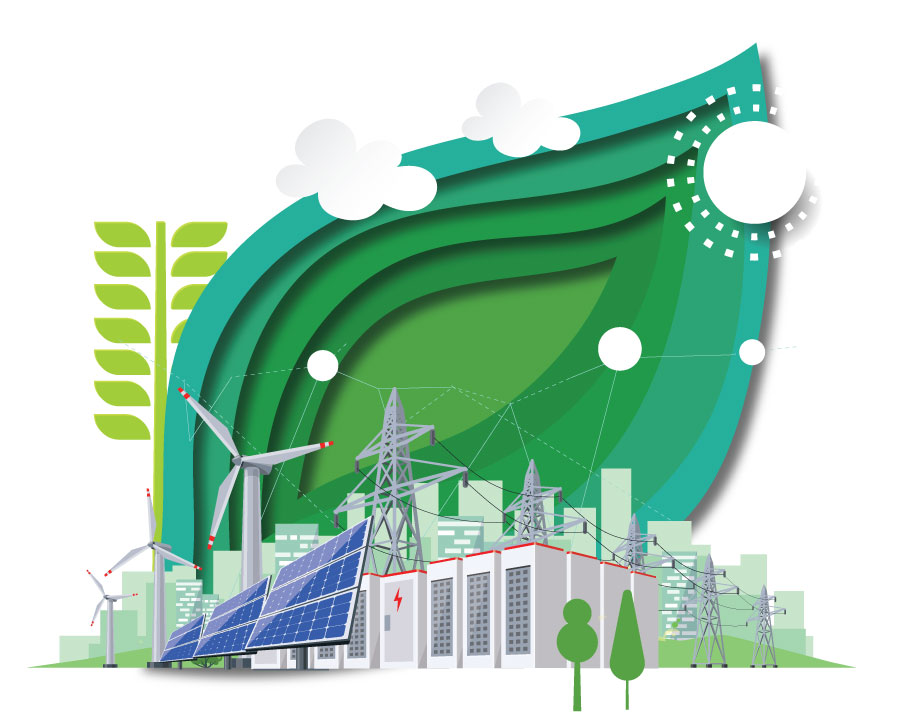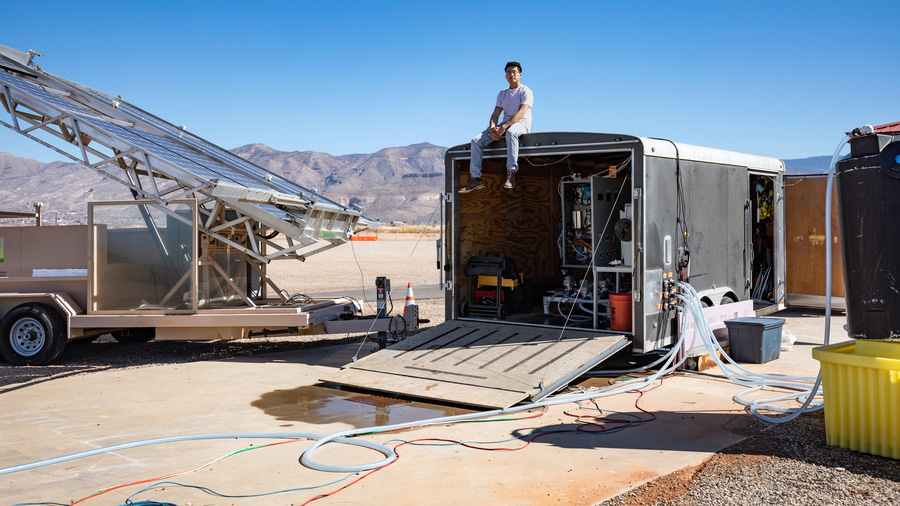Energy Blog: Mirage or Oasis for Climate Action?
The glimmering modernity of the United Arab Emirates’ wealth-draped desert towers was like Disneyland for climate enthusiasts during the first two weeks of December 2023, as tens of thousands of activists, bureaucrats, and dealmakers descended on Dubai for COP28. As one of the world’s largest oil producers, the UAE seems an unlikely place for a discussion about a decarbonized future. But for this Texan, it seemed appropriate. After years of watching the headlines from afar and even mocking its relevance, I decided to attend in person this year, and I felt right at home.
Finding a way for the UAEs and Texases of the world to play a role in a decarbonized future will be critical for rapid global action. Petrostates have enough power to delay climate action if they choose to and turbocharge it if they leverage their technological expertise (and wealth) to promote zero-carbon or even carbon-negative solutions.
“COP” stands for the Conference of Parties, an official gathering of signatories to the United Nations Framework Convention on Climate Change, the 1992 climate treaty now signed by 198 nations. But unlike some early COP meetings that might include just a few thousand diplomats as the main point of the conference was international negotiations, COP28’s attendance was enormous. Unofficially, the meeting included 38,000 diplomats and official observers, while the number of investors, business leaders, academics, or enthusiasts was nearly double that. It was a sensory overload of interactive options, with booths, pavilions, speeches, demonstrations, and various events bookended by expensive food and packed crowds for the main attractions.
 In the Green Zone set aside for the non-official public, the crowds were quite large, going beyond suit-wearing stiffs like me to include students, families with children in strollers, occasional protesters, and casual visitors.
In the Green Zone set aside for the non-official public, the crowds were quite large, going beyond suit-wearing stiffs like me to include students, families with children in strollers, occasional protesters, and casual visitors.
That mix creates a sometimes-intense dynamic. One member of the British parliament noted at a panel discussion that COP is the only place where the most vulnerable nations (such as low-lying island countries) get to look the world’s biggest emitters in the eye and make the case for why the rich polluters should care about their plights.
International negotiations often come down to a few fraught phrases or even single words. This year, one semantic battle was over whether the goal was to “phase down” or “phase out” fossil fuels, with the implication of eventual elimination, while another was whether the problem was fossil fuels themselves or only “unabated” fossil fuels. With a surprising last-minute landmark agreement, the negotiators settled on the ambiguous yet resolute “transitioning away from fossil fuels in energy systems.”
More by Michael E. Webber: Climate of Optimism
Secretary John Kerry, President Biden’s Special Envoy on Climate Change, was adamant while discussing phase down that unabated fossil fuel usage must end. The implication of that position was that the days of business-as-usual for fossil fuels are numbered, while allowing that oil and gas might still have a place if their carbon emissions can be scrubbed from the flue gas or removed after the fact via direct air capture.
In my view, this position irritates most environmentalists but recognizes that the United States—a much bigger producer of fossil fuels than the UAE—sees the world much the same as any other petrostate. We need to reduce emissions quickly, but those legacy energy sectors are important to the economy, and it would be unwise to try to eliminate them outright or overnight.
Aside from the subtle shifts on language, diplomats announced agreements on the establishment of a loss-and-damage fund to pay for climate change-related disasters, tripling renewables, tripling nuclear, and reducing methane. All of these were excellent, unexpected, and a huge step in the right direction.
More on This Topic: Climate Action is an Engineering Workforce Opportunity
And two looming technological innovations threatened to remake the playing field of climate action: Nuclear fusion (if you told me last year that Secretary Kerry would give a speech on fusion, I would have guffawed) and artificial intelligence, which could be part of the solution as a way to accelerate design of new fusion reactors or part of the problem as it consumes ever-larger quantities of electricity.
The whole event was a rollercoaster of collegiality, companies trying to outdo each other with their bold visions, and behind-the-scenes nuts-and-bolts negotiations. Though I still am unconvinced of its criticality to solving the climate crisis compared to on-the-ground local policies that make it harder to pollute, I think it was worthwhile. Maybe I’ll see you at COP29.
Michael E. Webber is McKetta Energy Chair in Mechanical Engineering at the University of Texas at Austin.
Finding a way for the UAEs and Texases of the world to play a role in a decarbonized future will be critical for rapid global action. Petrostates have enough power to delay climate action if they choose to and turbocharge it if they leverage their technological expertise (and wealth) to promote zero-carbon or even carbon-negative solutions.
“COP” stands for the Conference of Parties, an official gathering of signatories to the United Nations Framework Convention on Climate Change, the 1992 climate treaty now signed by 198 nations. But unlike some early COP meetings that might include just a few thousand diplomats as the main point of the conference was international negotiations, COP28’s attendance was enormous. Unofficially, the meeting included 38,000 diplomats and official observers, while the number of investors, business leaders, academics, or enthusiasts was nearly double that. It was a sensory overload of interactive options, with booths, pavilions, speeches, demonstrations, and various events bookended by expensive food and packed crowds for the main attractions.

ASME Addresses Climate Change
Since 1880, ASME has taken on society’s biggest and most technical challenges. Today, humanity is facing one of its largest challenges ever: climate change.
That mix creates a sometimes-intense dynamic. One member of the British parliament noted at a panel discussion that COP is the only place where the most vulnerable nations (such as low-lying island countries) get to look the world’s biggest emitters in the eye and make the case for why the rich polluters should care about their plights.
International negotiations often come down to a few fraught phrases or even single words. This year, one semantic battle was over whether the goal was to “phase down” or “phase out” fossil fuels, with the implication of eventual elimination, while another was whether the problem was fossil fuels themselves or only “unabated” fossil fuels. With a surprising last-minute landmark agreement, the negotiators settled on the ambiguous yet resolute “transitioning away from fossil fuels in energy systems.”
More by Michael E. Webber: Climate of Optimism
Secretary John Kerry, President Biden’s Special Envoy on Climate Change, was adamant while discussing phase down that unabated fossil fuel usage must end. The implication of that position was that the days of business-as-usual for fossil fuels are numbered, while allowing that oil and gas might still have a place if their carbon emissions can be scrubbed from the flue gas or removed after the fact via direct air capture.
In my view, this position irritates most environmentalists but recognizes that the United States—a much bigger producer of fossil fuels than the UAE—sees the world much the same as any other petrostate. We need to reduce emissions quickly, but those legacy energy sectors are important to the economy, and it would be unwise to try to eliminate them outright or overnight.
Aside from the subtle shifts on language, diplomats announced agreements on the establishment of a loss-and-damage fund to pay for climate change-related disasters, tripling renewables, tripling nuclear, and reducing methane. All of these were excellent, unexpected, and a huge step in the right direction.
More on This Topic: Climate Action is an Engineering Workforce Opportunity
And two looming technological innovations threatened to remake the playing field of climate action: Nuclear fusion (if you told me last year that Secretary Kerry would give a speech on fusion, I would have guffawed) and artificial intelligence, which could be part of the solution as a way to accelerate design of new fusion reactors or part of the problem as it consumes ever-larger quantities of electricity.
The whole event was a rollercoaster of collegiality, companies trying to outdo each other with their bold visions, and behind-the-scenes nuts-and-bolts negotiations. Though I still am unconvinced of its criticality to solving the climate crisis compared to on-the-ground local policies that make it harder to pollute, I think it was worthwhile. Maybe I’ll see you at COP29.
Michael E. Webber is McKetta Energy Chair in Mechanical Engineering at the University of Texas at Austin.




